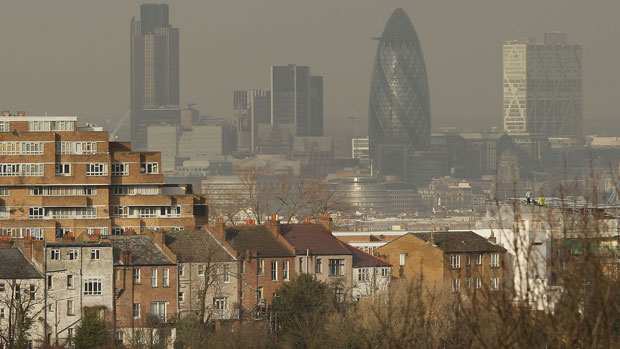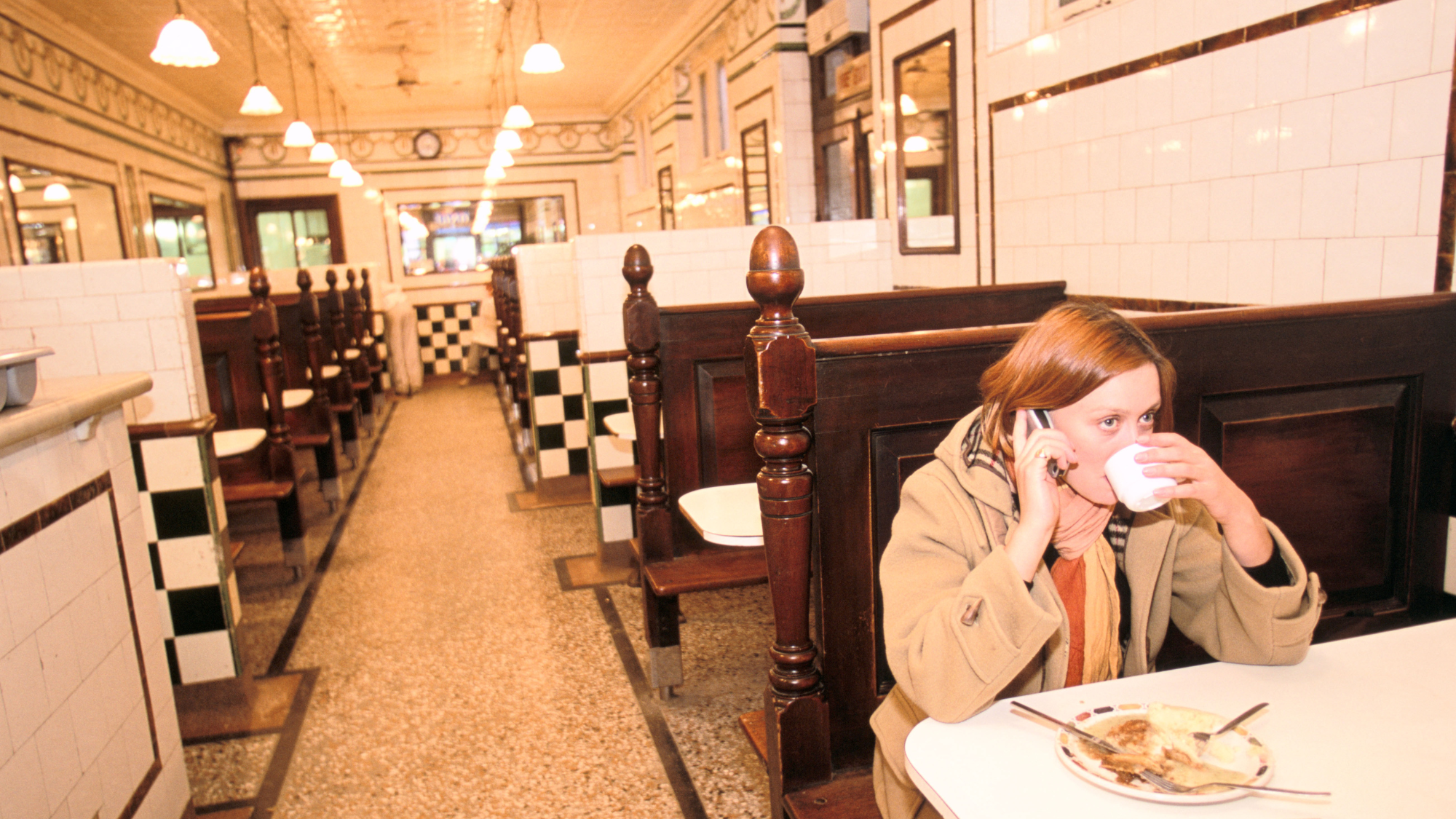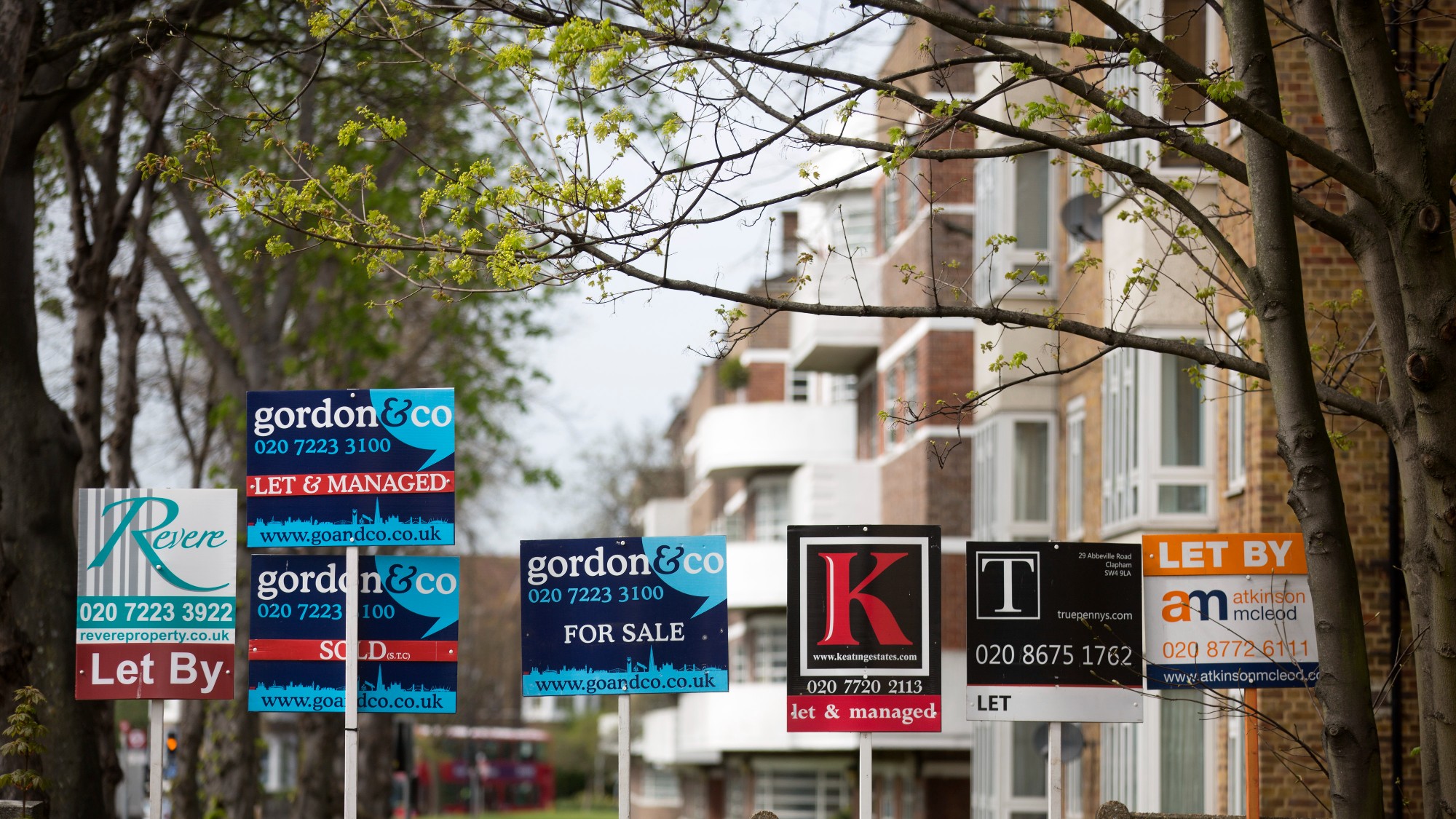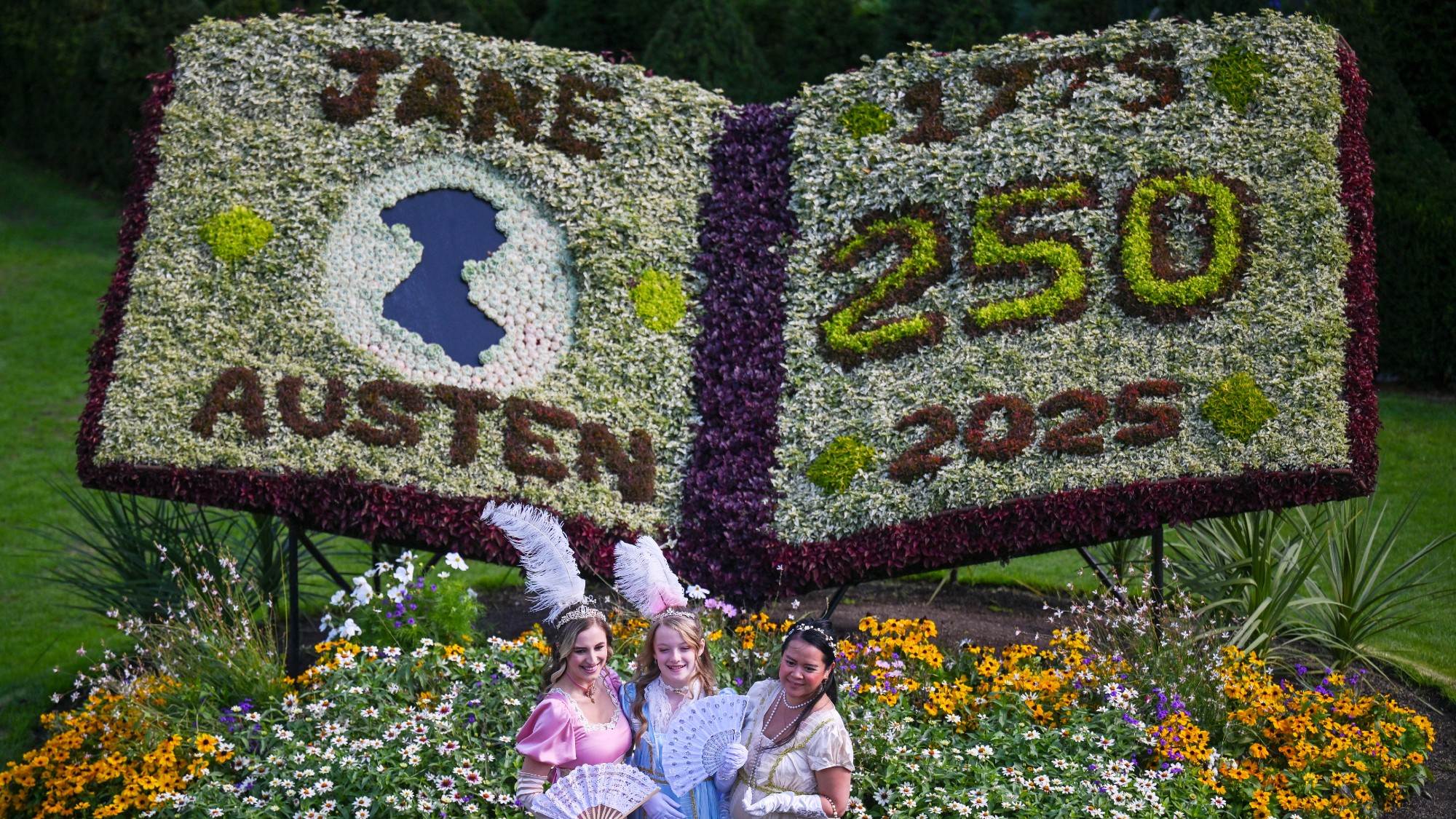Would London house prices plummet after a no-deal Brexit?

A free daily email with the biggest news stories of the day – and the best features from TheWeek.com
You are now subscribed
Your newsletter sign-up was successful
Average property prices will drop by 6.2% if the UK leaves the EU without a deal, a study has claimed.
Analysis by leading accountancy firm KPMG suggests house prices across the country will nosedive if the UK goes ahead with a no-deal Brexit on 31 October, reports The Guardian.
And a drop of up to 20% is “not out of the question” if the market reacts worse than expected, says the research.
The Week
Escape your echo chamber. Get the facts behind the news, plus analysis from multiple perspectives.

Sign up for The Week's Free Newsletters
From our morning news briefing to a weekly Good News Newsletter, get the best of The Week delivered directly to your inbox.
From our morning news briefing to a weekly Good News Newsletter, get the best of The Week delivered directly to your inbox.
House price growth across the UK has already slumped since the 2016 EU referendum, with a further 1.1% fall predicted this year.
London homeowners should expect to see an average of £31k wiped off the value of their homes in the event of no-deal, says This is Money. KPMG forecasts that a Brexit deal would see the average London price at £453,000, while no-deal would see this reduced to £422,000.
Yael Selfin, chief economist at KPMG UK, told This is Money: “If we see a fall in confidence, as a result of a no-deal Brexit disruption, and a decline in households’ real income due to higher inflation eating into smaller wage rises, that could see house prices in the South East fall by 0.6 per cent this year and by 6.7 per cent in 2020.
“So anyone who bought a home recently will likely find themselves in negative equity at least in the short-term until prices pick up again.”
A free daily email with the biggest news stories of the day – and the best features from TheWeek.com
Homeowners in Northern Ireland would likely see the value of their homes dropping by an average 7.5% if the UK exits the European Union without a deal, found the study.
This year, the UK has already seen the weakest national growth for house prices since 2012. The average UK house price was £230,000 in June, around just £2,000 higher than a year ago, says the Guardian.
London house prices drop 2.9% in 2019
15 August 2019
House prices have dropped in the south of England in 2019, with London performing uniquely poorly, figures from the Office of National Statistics’ (ONS) price index revealed yesterday.
Among the index’s key findings was the report that in London, prices have sunk 2.9% in the year to June. “Average house prices in London have now been falling over the year each month since March 2018,” says the report.
Despite the South’s low growth rate, the UK as a whole saw an increase in property prices of 0.9%. Nationally, the average price of a house was £230,000 - £2,000 higher than the same month last year.
This relatively flat overall performance is the result of large regional differences, with Wales, for example, contrasting London by experiencing a 4.4% hike in property prices.
The BBC reports that in Northern Ireland, house prices “between April and June were 3.5% higher than the same time last year.”
Other areas of growth include the East Midlands, which saw a growth rate of 3.2%, while the West Midlands saw growth of 2.6%.
According to the Guardian, the news marks “the first time that average prices had fallen in all three regions of southern England, covering an area extending from Milton Keynes in the north to Lands End in the west and Dover in the east, since September 2009.”
The paper asked Nick Leeming, the chairman of estate agent Jackson-Stops, if he could pinpoint a cause: “Data makes it clear that continued uncertainty as we creep ever closer to leaving the EU without a deal has caused hesitancy in some areas of the property markets,” Leeming said.
The Financial Times quotes Dilpreet Bhagrath, mortgage expert with online mortgage broker Trussle, who agrees on the source of the issue: “With house prices unchanged from May 2019, the property market still remains stagnant, and with a no-deal Brexit looming, this suggests that would be house-buyers are wary of committing to make the move.”
“With Brexit due to occur on 31 October - and it is currently very unclear what will happen then – we believe that uncertainty will weigh down on the economy over the next few months at least and hamper the housing market,” said Howard Archer, chief economic adviser at the EY Item Club, quoted by the Independent.
“Consumers may well be particularly cautious about committing to buying a house, especially as house prices are expensive relative to incomes. Additionally, it looks questionable whether the labour market and earnings growth will sustain their recent strength over the coming months as companies are faced by a soft economy, domestic political and Brexit uncertainties and a challenging global environment. Consequently, we suspect house prices will rise by no more than 1.5 per cent over 2019,” Mr Archer said.
London house prices suffer sharpest fall in decade
1 August 2019
House prices in London have experienced their sharpest fall in a decade as the capital’s property market continues its course correction after two decades of uninterrupted growth.
Figures from the Office for National Statistics showed that property values in London fell by 4.4% in the year to May, their biggest decline since a 7% drop in the year to August 2009, amid a dearth of potential buyers. “The capital bears the brunt of the nationwide torpor in the property market,” says The Guardian.
“London saw a surge in house price growth after the financial crash that saw prices almost double before cracks began to appear in late 2016,” says Sky News. It cites “a consequence of concerns about affordability after the boom and shaky sentiment since the Brexit vote”.
The Times agrees that the capital’s property market “has struggled since the Brexit referendum in June 2016, when house prices were rising by about 8.2%”. The newspaper adds that “buyers have since been waiting for political certainty and sellers have been reluctant to enter a slowing market”.
With the government promising to take the UK out of the EU with or without a deal by 31 October, Robert Gardner, Nationwide’s chief economist, warned of “mixed signals” from the UK housing market, saying it is caught between Brexit uncertainty and favourable economic conditions.
“In the near term, healthy labour market conditions and low borrowing costs will provide underlying support, though uncertainty is likely to continue to exert a drag on sentiment and activity,” he said.
The Brexit deadlock was blamed for wiping £20,000 off the value of an average London property in a year, but another factor is the growing number of older homeowners staying put in larger homes and therefore preventing younger buyers from moving up the ladder.
Experts at Nationwide said more than half of homeowners are now living in “under occupied” properties with at least two spare bedrooms. Among the over-65s, more than two-thirds of homes have at least two spare bedrooms, a marked increase over the past two decades.
“The shortage of sales of larger family homes by ‘downsizers’ could be a major factor preventing the formation of housing ‘chains’ that allow younger buyers to move out of small starter flats,” says Homes and Property.
While most property experts predict the market will remain in limbo until at least 31 October, “others are waiting for much-anticipated measures to slash stamp duty under Prime Minister Boris Johnson”, City A.M. reports.
Former Rics residential chairman, Jeremy Leaf, said: “One of the reasons for the lack of activity is clearly political uncertainty but there is no doubt that talk of changes to stamp duty is also weighing on perspective sellers’ minds.”
Is the slump coming to an end?
18 June 2019
House prices in many parts of London have been falling for some time as the overpriced market corrects itself, but new research suggests the long slump could finally be coming to an end.
The Daily Telegraph’s Marianna Hunt says “dampened demand, as buyers were put off by tax changes, high prices and poor value for money”, combined with uncertainty around Brexit has seen the number of sales in the capital fall by a quarter over the past five years.
Now new research by property website Zoopla suggests the slump in house price growth may be slowing. In October 2018 the level of house price falls plateaued and the number of areas in London registering a drop in prices has since fallen from 80% in October to 68% today.
House price growth is predicted to be flat this year before picking up in 2020. “As the cost of buying in the capital realigns with average salaries, experts predict that demand will bounce back,” says Hunt.
Separate research by Rightmove also points to tentative sings the collapse in London’s housing market is slowing.
In the year to June, asking prices across London fell by 2%, which is the smallest decline measured since January and an improvement on the 3.8% decrease recorded in March.
Homes & Property says “the slight upswing is thanks to higher numbers of first-time buyers taking advantage of low mortgage rates and the market slowdown”.
“The London housing market is coming to the end of what can be described as a three to four year repricing process, in which many areas have experienced small, single digit falls,” said Richard Donnell from Zoopla. “House prices grew rapidly between 2010 and 2016 and we’re currently seeing those prices fall back into line.”
Hunt says “house prices in London fell partly because of the nature of property cycles: values rise too high and then this is followed by a correction as local people struggle to afford the higher prices”.
Yet while market conditions currently favour first-time buyers, “there remains a gulf between wages and prices”, says Homes & Property.
Despite recent falls, the average asking price for a home in the capital still currently stands at £618,880, almost double the average of the rest of the country.
“Affordability is arguably the biggest drag on the market as, despite sluggish price growth as a result of Brexit, many still struggle to raise the capital required for a mortgage deposit,” says Marc von Grundherr, director of Benham and Reeves.
Research from Halifax has found key public sector workers, including nurses, teachers, paramedics, police officers and firefighters, can only afford to own a home in 8% of towns across Britain.
The mortgage provider looked at housing affordability for the five professions across 515 towns, including 31 London boroughs. It found only 40, or 8%, of these areas were affordable – down from 24% in 2014.
In some areas, a home typically costs more than 18 times a key worker’s average annual wage, with the least affordable areas for key workers unsurprisingly in London and the Southeast, “where house prices are significantly higher than the national average”, reports Metro.
City bucks downward trend
30 May 2019
As average London house prices continue to fall, some select areas of the capital continue to buck the trend, with the City recording the biggest post-recession recovery out of any region in the UK over the past decade.
According to the latest Land Registry House Price Index figures, London house price growth experienced a 1.9% fall over the past year, with the average home costing £463,283 in March 2019, down from £472,357 12 months before.
“Once again, however, not all home owners are equally affected,” writes Paul Harper for Which? magazine.
The prime housing market in London’s central zones, which attract a high concentration of international investors, was hardest hit. In Kensington and Chelsea, prices dropped by a massive 16.4%, while prices in Westminster plummeted 14%.
“Brexit uncertainties and consumer worries about the economy have weighed on the market, compounding the problem of stretched affordability in London and the South,” writes Ian Stewart, Deloitte’s chief economist in the UK, on Reaction. “Higher rates of stamp duty on more expensive properties and weaker demand from foreign buyers have had their greatest effect on the London market. Meanwhile increased rates of stamp duty on additional homes, reduced tax reliefs and new regulations have dented the attractiveness of buy-to-let.”
Going against the trend, house prices in the City of London borough rocketed by 16.2% over the past year.
The Daily Express says new data has also highlighted that it is in the City where the biggest post-recession recovery has been made in terms of property prices.
A decade on from the financial crisis, price growth stands at 143.4% in the City of London. In June 2009, the average house price in this location stood at £348,751, while in February this year, the figure was £848,890.
This is compared to some areas of Northern Ireland where average prices are still at least 10% down on their pre-crash levels.
“That said, it’s worth bearing in mind that central London markets tend to record a small number of home sales at high prices, so the percentage increases and decreases can seem extreme,” says Harper at Which?.
While the continued drop in London house prices in general may not be ideal for current sellers, “this fall provides some hope for those looking to buy, especially for first-time buyers who are looking to step a foot on the property ladder”, Dilpreet Bhagrath, mortgage expert for online mortgage broker Trussle, told Money Observer.
Mark Harris, chief executive of mortgage broker SPF Private Clients, adds: “It could be argued that there was a need for a correction in the capital, with property prices racing away and putting ownership beyond the reach of many ‘ordinary’ people.
“Even with these price corrections, London is still the most expensive place to buy property. There remains a significant gap between incomes and property prices, although with lenders keen to lend and offering good rates at high loan to values, there is a glimmer of hope for those struggling to pull together the necessary deposit.”
Spring surge fails to boost market
21 May 2019
The annual spring housing surge has done little to boost London’s flatlining property market, according to Rightmove.
The latest figures from the property website reveal house prices in the capital remain down year-on-year, driven by a slump in inner city sales.
Compared to 12 months ago, homes in outer London are 0.9% cheaper, whereas prices in inner London have fallen by 3.8%. Overall, homes in Greater London were worth 2.5% less than a year ago, meaning the average cost of a house was down £16,157 to £621,589.
New sellers in all but two boroughs are asking for less on average than a year ago. Only Barking and Dagenham in east London, and Bexley in the south east, have held their year-on-year value, “and they were the two cheapest boroughs last month”, says City A.M.
While this may spell trouble for existing homeowners, “house price trends can be good news for savvy landlords”, says The Daily Telegraph.
“The reason is that London boroughs differ dramatically in terms of prices and rent expectations,” explains the newspaper.
“Traditionally the capital’s high prices have pushed landlords seeking higher yields to other parts of the country, such as university towns in the north of England. But new research has underlined how falling prices in London mean that rental yields are on the up.”
The continuing slump in the capital’s property market stands in stark contrast to other parts of the UK. According to Rightmove, house prices in Wales, the Midlands and North West of England have hit record highs despite “Brexit blues”.
Average asking prices in Wales have broken through the £200,000 barrier for the first time while the average cost of property in the West Midlands has risen 3% to £232,247 compared to last year. Average prices have also risen by 2.1% annually in the North West.
The Sun says the latest figures “back Rightmove's previous predictions that Brexit will actually boost the housing market by up to £3,500”.
Miles Shipside, director of Rightmove, said the increases seen outside of London are the “result of a combination of strong demand, buyers’ affordability headroom, and a continuing shortage of suitable properties”.
He added that Brexit was not really on the agenda of home movers in those areas.
This follows a wider trend that suggests uncertainty over Brexit appears to be subsiding.
“I’ve noticed an increase in viewings and offers over the last few weeks,” Jak Kypri, director of Harpers & Co Estate Agents in Bexley, told City A.M. “I think it’s because there is less talk about Brexit. Things have calmed down now; they all went away for Easter, the sun is shining, people are cutting the grass in their gardens, the country seems slightly less tense.”
Stagnation spreads to Southeast
7 May
The deepening property market slump in London has spread to the rest of England’s southeast which experienced its first annual fall in seven years, official figures from the Land Registry have revealed.
Nationwide prices increased 0.6% in the year to February 2019, while London saw a fall of 3.8%, faster than the 2.2% decline recorded in January “and the worst performance in a decade”, says The Independent.
It marks the 12th consecutive month where prices have fallen or flatlined in the capital. Prices are dropping in all but nine of London’s 33 local authority areas, “with some of the boroughs that were experiencing the most rapid growth last year now suffering the biggest reverses”, reports Homes and Property.
Hackney, Southwark and Harrow all recorded price drops of more than 6%, while Westminster took a massive 19.6% plunge, “although this is likely to have been exaggerated by fewer mansion sales”, says the property magazine.
Jonathan Hopper, managing director of buying agents Garrington Property Finders, said: “The sheer scale of the decline in London prices is breathtaking. In the space of a month, the annual rate of price falls in the capital has almost doubled”.
“Southeast England has also caught the capital’s cold, with prices in the commuter counties now falling on an annual basis for the first time in more than seven years,” he added.
Prices fell by 1.8% in the region in the year to February, offsetting stronger growth in other parts of the UK, most notably in the Northwest and the West Midlands which rose by 4% and 2.9% respectively.
The remarkable turnaround in what was once Britain’s boom market has been attributed to continued uncertainty around Brexit, fewer overseas buyers, tax changes and the stratospheric levels of prices before the downturn.
However, while London property prices are falling, the capital remains the most expensive place to buy with an average of £460,000.
Howard Archer, chief economic adviser at EY ITEM Club, said the figures “very much fuel the overall impression that the housing market is being hampered as buyer caution amid already challenging conditions is being reinforced by recent heightened Brexit and economic uncertainties”.
He added that “there are significant variations across regions with the overall picture being dragged down by the weakness in London and the Southeast”.
Archer predicted a 1% rise for the coming year but said he “would not be at all surprised” if prices continue to stagnate.
Investor hotspots hit hardest
1 April
London house price decline has been accelerating at its fastest rate in a decade since the start of the year, new figures have revealed.
According to a survey from leading lender Nationwide, the average price of a London home fell 3.8% to £455,594 in the three months to March compared with the same period in 2018.
“That was the biggest drop since the depth of the property market rout that followed the financial crisis in 2009 and wiped £18,182 off the average value”, says Homes and Property.
Uncertainty around Brexit has been the main driver of price stagnation although many experts believe an over-inflated market after nearly two-decades of uninterrupted growth has made a correction in the capital inevitable.
“Affordability, in our opinion, is very much the main reason why London has… hit this slowdown, but it has been exacerbated by uncertainty, mainly Brexit-related,” says Aneisha Beveridge, head of research at estate agent Hamptons International.
City A.M. says the “the market for high-end homes in London peaked about four years ago. But after almost a decade of growth, the subsequent downturn has spread to mid-market homes as well”.
“While the average price across the capital has fallen, some areas are more affected than others – and the worst hit areas tend to be investor hotspots,” says Which? magazine.
Analysing data from the Land Registry’s UK House Price Index, the consumer magazine found central London boroughs such as Westminster and Camden traditionally popular with foreign investors experienced the biggest fall in average prices in the year to January.
By contrast, the outer suburbs of Ealing and Newham saw substantial increases in their average price, of 4.95% and 4%, respectively.
“These areas tend to be more popular with families and first-time buyers, who may be unlikely to alter their plans based on Brexit,” says Which?
First-time buyers are the one group who appear largely undeterred by the current political uncertainty.
City A.M. cites research from Hamptons which “shows that this cohort was responsible around half of home purchases in London last year, many of them benefiting from the government’s Help to Buy scheme and stamp duty relief for buyers taking a first step onto the property ladder”.
London house prices fall at fastest rate in a decade
20 March
London house prices fell at their fastest rate for almost a decade in January, wiping more than £7,500 off the price of an average home in the capital.
Figures from the Office for National Statistics (ONS) revealed house prices in January rose by an annual 1.7% across the whole of United Kingdom, the smallest increase since June 2013.
However, the data varied widely nationwide, with the Midlands experiencing annual growth of 4.3%. By contrast London’s housing market fell 1.6% in the year to January, its biggest drop since September 2009, just after the low point of the global financial crisis.
According to the Land Registry the average price of a London home stood at £472,230 at the start of the year, down from £479,780 twelve months previously.
It also marks the 11th straight month where prices have not risen in London. Reuters reports that “prices in the capital were down 3.3% from their recent peak in June 2017, compared with an almost 18% peak-to-trough fall during the financial crisis”.
There were particularly heavy falls in Westminster, where prices slumped 14%, and in Camden where they were 8.3% lower.
Kevin Boa, real estate partner at Pinsent Masons, told City A.M.: “It’s no wonder that there is little buyer appetite whilst Brexit uncertainty persists, alongside the death of buy to let, increased stamp duty and the prospect of interest rate rises.”
Homes and Property predicted that “the Brexit uncertainty that has hung over the property market since the summer of 2016 would continue to depress prices if there is a delay to Britain’s departure from the European Union”.
–––––––––––––––––––––––––––––––For a round-up of the most important stories from around the world - and a concise, refreshing and balanced take on the week’s news agenda - try The Week magazine. Start your trial subscription today –––––––––––––––––––––––––––––––
However, Boa said that “regardless of what happens with Brexit, there remains a massive gulf between asking prices and buyers’ ability to afford mortgages, especially in the south east”.
“The bottom line is we are still not building enough homes to meet population forecasts, even if Brexit leads to a decline in net migration. Whatever happens with prices over the coming months and years, this chronic lack of housing is the biggest issue for the UK’s property market” he added.
ONS figures also showed the growth in London’s private rental prices rose by just 0.2% in the 12 months to February 2019, up from 0.1% in January 2019. This made the capital’s private rental growth the lowest in the country. Bad news for landlords, but good news for tenants in the city.
‘Wait-and-see’ approach replicated across UK
28 February
-
 The environmental cost of GLP-1s
The environmental cost of GLP-1sThe explainer Producing the drugs is a dirty process
-
 Nuuk becomes ground zero for Greenland’s diplomatic straits
Nuuk becomes ground zero for Greenland’s diplomatic straitsIN THE SPOTLIGHT A flurry of new consular activity in the remote Danish protectorate shows how important Greenland has become to Europeans’ anxiety about American imperialism
-
 ‘This is something that happens all too often’
‘This is something that happens all too often’Instant Opinion Opinion, comment and editorials of the day
-
 Arcadia: Tom Stoppard’s ‘masterpiece’ makes a ‘triumphant’ return
Arcadia: Tom Stoppard’s ‘masterpiece’ makes a ‘triumphant’ returnThe Week Recommends Carrie Cracknell’s revival at the Old Vic ‘grips like a thriller’
-
 American Psycho: a ‘hypnotic’ adaptation of the Bret Easton Ellis classic
American Psycho: a ‘hypnotic’ adaptation of the Bret Easton Ellis classicThe Week Recommends Rupert Goold’s musical has ‘demonic razzle dazzle’ in spades
-
 Can London’s pie and mash shops make a comeback?
Can London’s pie and mash shops make a comeback?Under the Radar Traditional East End eateries are on the ‘brink of extinction’ – but a younger generation is giving the Cockney cuisine an unexpected boost
-
 Breaking news: the rise of ‘smash hit’ rage rooms
Breaking news: the rise of ‘smash hit’ rage roomsUnder the Radar Paying to vent your anger on furniture is all the rage but experts are sceptical
-
 Why is London’s property market slumping?
Why is London’s property market slumping?Today's Big Question Some sellers have reported losses of hundreds of thousands of pounds
-
 Jane Austen lives on at these timeless hotels
Jane Austen lives on at these timeless hotelsThe Week Recommends Here’s where to celebrate the writing legend’s 250th birthday
-
 David Hockney at Annely Juda: an ‘eye-popping’ exhibition
David Hockney at Annely Juda: an ‘eye-popping’ exhibitionThe Week Recommends ‘Some Very, Very, Very New Paintings Not Yet Shown in Paris’ testifies to the artist’s ‘extraordinary vitality’ and ‘childlike curiosity’
-
 The Peninsula: London’s first billion-pound hotel
The Peninsula: London’s first billion-pound hotelThe Week Recommends As the capital’s super-luxury hotel scene continues to expand, the respected brand is still setting the standard